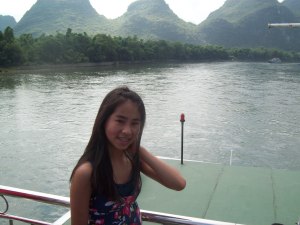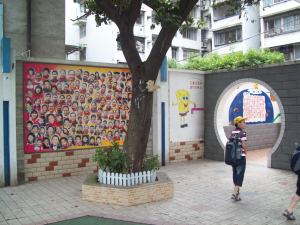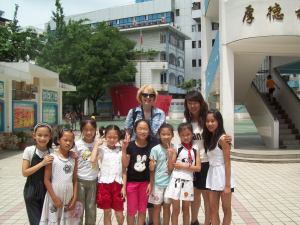 Each time we prepare to go to China, a few well-meaning people say, “Your trip will be good for Sophie. It will show her how lucky she is.” I thought of this as we boarded the Li River cruise. Our brochure compared the river to a “jade ribbon winding among thousands of grotesque peaks.” Or, as the Tang Dynasty poet Hah Yu put it,
Each time we prepare to go to China, a few well-meaning people say, “Your trip will be good for Sophie. It will show her how lucky she is.” I thought of this as we boarded the Li River cruise. Our brochure compared the river to a “jade ribbon winding among thousands of grotesque peaks.” Or, as the Tang Dynasty poet Hah Yu put it,
The river winds like a blue silk ribbon
While the hills erect like green jade hairpins.
For three and a half hours, we cruised along, watching the “spectacular landscapism and elegant hills, the towering peaks, the variegated cliffs and odd-shaped crags” shaped like a cat’s face with little ears, like an apple, like a snail. We passed the Hill of Nine Horses. I could only make out two of the horses and a piggybank. We passed the scene depicted on the back of a 20 yuan note and bamboo growing along the water that looked like peacocks’ tails. We passed water buffalo and cormorants and bamboo rafts that are no longer made of bamboo but of PVC pipe and farmland that is now rented out for cell phone towers.
 And I wondered, as I often do, at the idea that travel’s primary purpose is to instill appreciation for our own lives, which always seems to me a bit smug, a way of holding ourselves apart from other cultures. There are many reasons to take a child back to the land of her birth: to expose her to the beauty of another place and the variety of human possibility, to open up her imagination, to help her understand the complexity of her own roots. Maybe, somewhere along the way, she will also learn to appreciate her own privileges and opportunities.
And I wondered, as I often do, at the idea that travel’s primary purpose is to instill appreciation for our own lives, which always seems to me a bit smug, a way of holding ourselves apart from other cultures. There are many reasons to take a child back to the land of her birth: to expose her to the beauty of another place and the variety of human possibility, to open up her imagination, to help her understand the complexity of her own roots. Maybe, somewhere along the way, she will also learn to appreciate her own privileges and opportunities.
But this focus on how lucky our children are makes me nervous. In my research for my forthcoming book, I ran across a lot of frustration from adult adoptees about constantly being told that they were “lucky.” This emphasis ignores the sadness of having been born into situations that made it impossible for their birth parents to raise them. Though most feel great gratitude about some aspects of their lives, many do not regard it as lucky to have been separated forever by language and customs from their original homes. No one loves their impoverished family less than others love their wealthy ones.
So I’ve spent a lot of time pondering this notion of “luck” and how it relates to our trip. Last weekend, Sophie rode a double decker bus to Ms. H’s apartment for a visit. There, Sophie and Ms. H.’s daughter spent the afternoon reading books, watching a Barbie movie, and eating a fruit that tastes like a cantaloupe but looks like a gourd. Ms. H’s apartment was smaller than our western Pennsylvania house, but their TV was bigger than ours, Sophie said, not much of a revelation since everyone’s TV is bigger than ours. “I don’t even consider it a TV, really,” one of our friends likes to say. Sophie came home with the distinct impression that American pre-teens are more sophisticated (“It was a Barbie movie,” she said, still reeling) but that their lives are not that much different from their Chinese counterparts.
Later we went to visit a school in Guilin right when it let out for the three-hour lunch break. Some children ate at school rather than going home for hot meals cooked by grandparents, then jumped rope and played basketball in the courtyard or disappeared to nap in a special room in one of the three five-story buildings. The walls were colorful, covered with maps, charts, pictures, posters, and framed drawings by students. In the courtyard, Chinese children’s music played, then a saxophone solo by Ray Charles. Everywhere we went, we were mobbed by kids who said, “Hello!” and shrank away giggling when we answered. A bunch of kids in red kerchiefs greeted us with the Young Pioneers of the Communist Party salute.
It is true that China is a developing country, and this and government oppression has had occasional direct impact on our own lives. We have to boil all the water we drink. The government blocks Internet sites like Facebook, keeping us from easy communication with many friends. Most significantly, of course, we most likely owe our relationship with each other to a government policy limiting the number of children that people can have. The realities are mixed ones.
We feel very lucky that we can travel in China for six weeks, but such “luck” always involves trade-offs. We would not be here if not for the death of my mother—and for the fact that she left behind money for the education of her grandchildren. I am my daughter’s mother because of another mother’s loss.
“One hundred miles Lijiang River, one hundred miles art gallery,” our cruise brochure said, referring to the landscapes along that now-polluted river that have inspired writers and painters since ancient times. The tour itself was like a microcosm of the beauty and variety and contrasts and contradictions of China. I realized that what I want is for my daughter to have a sense of this complexity, to imagine, without fear, what it would have been like to have grown up here, to gain the tools to someday continue to follow her passion for travel. And, as the grotesque peaks erected before us, I hoped that she would end up feeling lucky—to be the product of not one, but two, rich heritages, of two cultures and families and sets of traditions, and that neither of them would end up feeling entirely foreign to her.
Comments
Fantastic sightseeing, river cruises are famous just because of them.